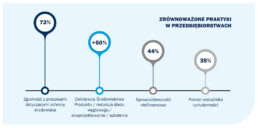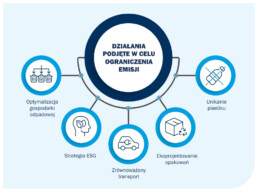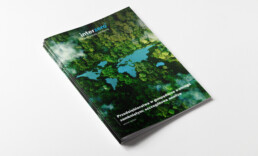Businesses in the circular economy: a detailed analysis
The pursuit of sustainability is not only a moral responsibility, but also key to the long-term success of companies. In an era of climate crisis and rising customer and investor expectations, companies must take proactive measures to reduce their environmental impact. The transformation towards a circular economy (GOZ) is becoming a priority, offering numerous business benefits such as cost reductions, improved reputation and increased innovation. These are the conclusions of our latest study "Businesses in the circular economy: a detailed analysis"..
Did you know that.
.... significant most companies want to implement sustainable initiatives or have already started the process? Such declarations were made by 71.1 to 84.9% managers representing medium and large companies from six European countries.
The increase in public awareness of lifestyles and consumption patterns is causing businesses, institutions and government bodies to recognise the need for an imminent change in strategy and to adopt new
direction.
ONLY 4% OF COMPANIES WILL NOT INVEST IN SUSTAINABILITY
More than 4 out of 10 companies (41.8% of managers participating in the Interzero survey) will invest up to €150,000 in sustainability over the next three years (23.9% up to 50,000 and 17.9% up to 150,000). More than half (53.9%) will spend more than €150,000, and more than 2 in 10 (24%) over €500,000.
What motivates companies to implement sustainable solutions?

Process efficiency is the main driver for implementing sustainable initiatives. This is followed by communication considerations and the company's image in the eyes of stakeholders. Taking these motivations into account, the next part of the analysis focused on a group of companies selected for the type of sustainable initiatives undertaken. To this end, an in-depth analysis was carried out, which showed that the most common practice is to verify the compliance of the business with environmental regulations (72% companies).
How do we minimise the negative impact on the environment?
Reducing the environmental impact of a company's activities in this way is a valuable competitive advantage. Of the actions taken to achieve this goal, respondents most often declared reducing emissions, optimising waste management, avoiding plastic, eco-designing packaging and developing an effective ESG strategy.

Interzero research: status, needs and trends in the circular economy
Interzero supports companies in adapting to sustainable business models through comprehensive advice and innovative environmental solutions. Our report presents the results of a survey of sustainability trends, market expectations and related business decisions of medium and large companies in Europe. Six countries were analysed: Italy, Austria, Poland, Slovenia, Croatia and Serbia.
The aim of our study was:
- understand and analyse market trends in the circular economy and sustainable development
- examining possible barriers to the use of best practice in the various countries surveyed
- Investigating the main sustainability needs of medium and large companies in the countries surveyed and analysing their readiness to adopt sustainable business models
- to create a benchmark for the state of development of ecological transformation in business models at European level by summarising the data obtained from all the countries analysed

Fill in the form to read the full report:
You will receive a report in pdf format at your email address. We encourage you to take a look at the results. Do you have questions about the report? Need help setting up a sustainability strategy for your company?
Write to us at the email address below!